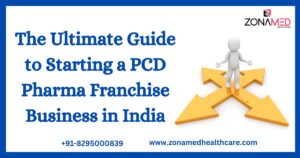Introduction
The pharmaceutical industry in India is a rapidly evolving landscape, with the Propaganda Cum Distribution (PCD) Pharma Franchise model becoming increasingly prominent. This model offers unique business opportunities but is also shrouded in myths and misconceptions. This article aims to dissect these myths, providing a clear and detailed understanding of what you really need to know about the PCD Pharma Franchise in India.
The Essence of PCD Pharma Franchise in India
Overview of PCD Model
The PCD Pharma Franchise model allows individuals or groups to market and distribute pharmaceutical products under the brand name of an established pharmaceutical company. It’s a low-risk, high-reward business model tailored for expansive reach in diverse market segments.
The Legal Landscape
Understanding the regulatory environment is crucial for operating smoothly within this industry. This includes registration with the Central Drugs Standard Control Organization (CDSCO) and understanding the Drugs and Cosmetics Act, which governs the pharmaceutical market in India.
Demystifying Common Myths
Investment Myths
One prevalent myth is that entering the PCD Pharma franchise requires massive capital. In reality, it is quite accessible compared to other business models, with varying investment levels based on the scope and intended market coverage.
Profitability
There’s a misconception that profitability in the PCD Pharma sector is either instantaneous or extremely delayed. The truth lies in strategic financial planning and market understanding, which we will explore deeply.
Market Saturation
Many assume the market is oversaturated, but with India’s growing healthcare demands, there is ample opportunity for strategic entries with the right product mix and marketing strategy.
Investment Insights
Capital Requirements
In the PCD Pharma Franchise business, the capital requirements are relatively modest, making it an accessible venture for many entrepreneurs. Initially, the investment primarily covers the cost of purchasing the franchise rights, stock inventories, and promotional materials. The exact amount can vary based on factors like the choice of products, the geographical area covered, and the terms set by the pharmaceutical company. Typically, the initial investment could range from a few thousand to several lakhs of rupees, designed to accommodate different scales of business ambitions. This financial flexibility is one of the key attractions of the PCD Pharma Franchise model, allowing for a gradual scale-up based on business performance and market response.
Choosing the Right Brand
Choosing the right brand in a PCD Pharma Franchise is a pivotal decision that can significantly influence your success in the pharmaceutical industry. It’s crucial to partner with a company that not only provides a diverse and in-demand product portfolio but also demonstrates a strong track record of market stability and growth.
Potential franchisees should assess the brand’s reputation, product efficacy, and compliance with regulatory standards. Additionally, the level of marketing support and the exclusivity of rights offered by the pharma company are key factors to consider. A thorough evaluation of these elements ensures that the franchisee aligns with a brand that not only enhances their market position but also supports sustainable business growth.
Profitability and Financial Planning
ROI Analysis
ROI (Return on Investment) analysis in a PCD Pharma Franchise is a crucial financial metric that helps investors understand the efficiency and profitability of their investment. Essentially, it measures the return generated on the money invested into the franchise relative to its cost. In the context of a PCD Pharma Franchise, the ROI calculation takes into account initial and ongoing investments such as the cost of drugs, marketing, distribution, and franchise fees against the revenue generated from sales.
A favorable ROI indicates that the franchise is generating effective returns, making it a viable business opportunity. It’s important for potential franchisees to perform a detailed ROI analysis to gauge the break-even point and project long-term profitability, ensuring they make informed decisions about where and how to invest their resources for maximum financial gain in the competitive pharmaceutical market.
Break-Even Point
In the context of a PCD Pharma Franchise, the break-even point represents the critical juncture at which the total costs of starting and operating the franchise are equal to the revenue generated from sales. This financial metric is essential for franchisees as it indicates the moment from which the business begins to generate profit rather than merely covering its initial and operational expenses.
Calculating the break-even point requires an understanding of fixed costs, such as initial investments in franchise fees and infrastructure, as well as variable costs, which include expenses like purchasing medicines, marketing, and distribution. For franchisees in the PCD Pharma sector, reaching the break-even point effectively means that the business has overcome its initial financial hurdles and is on a path to profitability, making this calculation a crucial tool for strategic planning and financial management.
Market Dynamics and Competition
Market Entry Strategies
In the PCD Pharma Franchise sector, effective market entry strategies are pivotal for establishing a strong foothold. Aspiring franchisees should begin by conducting a comprehensive market analysis, identifying potential gaps and customer needs that align with their product offerings. A strategic approach involves choosing a geographical area with less saturation and high demand for specific pharmaceutical products.
Networking with healthcare professionals and leveraging local market knowledge can also provide insights and aid in building credibility. Additionally, selecting a pharmaceutical company as a partner that supports with marketing materials, training, and competitive pricing can significantly enhance market entry efforts. By implementing these targeted strategies, new entrants can maximize their impact and establish a durable presence in the competitive PCD Pharma landscape.
Competitive Analysis
In the PCD Pharma Franchise sector, competitive analysis plays a pivotal role in shaping strategic decisions. By systematically assessing the strengths and weaknesses of competitors within the market, franchise owners can identify unique opportunities for differentiation and growth. This involves evaluating various aspects such as product range, pricing strategies, marketing techniques, and distribution networks.
For a PCD Pharma franchise, understanding these elements helps in positioning their offerings more effectively, ensuring they meet specific market needs while staying ahead of competitors. Consequently, robust competitive analysis not only aids in solidifying one’s market presence but also in anticipating shifts in market dynamics, enabling proactive adaptations to the business strategy.
Product Portfolio Management
Selection Criteria
In the PCD Pharma Franchise model, securing exclusive rights is a pivotal aspect that can significantly enhance a franchisee’s market position and profitability. Exclusive rights refer to the special privileges granted by the franchisor to the franchisee, allowing them to sell certain pharmaceutical products within a specified geographical area without facing competition from other franchisees of the same brand.
This exclusivity ensures that the franchisee can build a strong customer base and brand loyalty without the concern of internal competition. It provides a clear pathway to maximize sales and marketing efforts, fostering an environment where the franchisee can focus on growth and service excellence within their territory. This strategic advantage is essential for sustaining long-term business success in the competitive pharmaceutical industry.
Regulatory Compliance and Quality Assurance
Licensing
In the PCD Pharma Franchise sector, obtaining the necessary licenses is a crucial step towards establishing a legal and operational business. The licensing process involves securing approvals from various regulatory bodies such as the Central Drugs Standard Control Organization (CDSCO) and the State Drugs Standard Control Organization, depending on the geographical scope of operations.
These licenses ensure that the franchise operates within the legal frameworks set by the Indian Drugs and Cosmetics Act. It’s imperative for franchisees to adhere to these regulations to maintain the integrity and quality of the pharmaceutical products they distribute. Moreover, proper licensing helps build credibility with stakeholders and customers, fostering a trustworthy brand image in the competitive market.
Marketing and Sales Strategies
Effective Marketing Techniques
In the PCD Pharma Franchise industry, effective marketing techniques are pivotal for growth and success. A strategic approach often includes both digital and traditional marketing platforms to maximize reach and engagement. Online marketing through SEO-optimized websites, targeted PPC campaigns, and a strong social media presence can attract potential clients and healthcare professionals.
Additionally, offline strategies such as attending medical conferences, conducting workshops, and distributing brochures and samples in hospitals and clinics prove beneficial. Personal relationships with healthcare providers also play a critical role, as trust and reliability are key in the pharmaceutical industry. Combining these strategies can significantly enhance visibility and credibility, ultimately driving sales and fostering sustainable business growth.
Sales Force Excellence
Sales force excellence is crucial for the success of a PCD Pharma Franchise, as it directly influences the reach and impact of the franchise in the competitive pharmaceutical market. An effective sales team not only enhances product distribution but also builds strong relationships with healthcare professionals, which are essential for sustained business growth.
To achieve sales force excellence, it is important to focus on rigorous training programs that provide comprehensive product knowledge and sales skills. Additionally, implementing robust performance evaluation systems and offering incentives can motivate sales representatives to achieve higher targets. Overall, a well-trained, highly motivated, and strategically managed sales force can significantly increase the penetration and profitability of a PCD Pharma Franchise.
Training and Support
Importance of Continuous Training
The importance of continuous training in the PCD Pharma Franchise cannot be overstated. In a rapidly evolving pharmaceutical industry, staying updated with the latest developments in medicine, technology, and regulatory standards is crucial. Continuous training ensures that franchise owners and their staff are well-informed about new drugs, treatment protocols, and marketing strategies, which are essential for maintaining competitive edge.
It also enhances the quality of service and compliance with health regulations, ultimately leading to improved patient outcomes and business growth. Therefore, investing in ongoing educational programs and training workshops is vital for sustaining and expanding a successful PCD Pharma Franchise.
FAQs
What is a PCD Pharma Franchise?
Why is the PCD model considered a low-risk investment?
How does one choose the right pharmaceutical company to partner with?
What are the typical profit margins in a PCD Pharma franchise?
Can technology significantly impact the operations of a PCD Pharma franchise?
What are the major challenges faced by new entrants in this industry?
Conclusion
In this comprehensive exploration of the PCD Pharma Franchise model in India, we have debunked common myths and provided a detailed roadmap for both aspiring and current franchise holders. Understanding the nuances of this business model can lead to significant returns and a robust position in the healthcare market.





